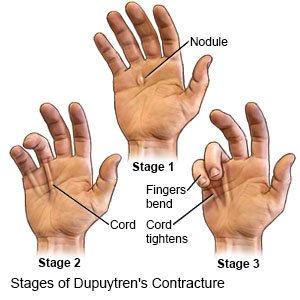Dupuytren Contracture
Medically reviewed by Drugs.com. Last updated on Aug 4, 2025.
AMBULATORY CARE:
Dupuytren contracture
occurs when tissues in your hand thicken. The thickened tissue may form cords that extend from your palm to your finger. The cords may shorten, and your palm or finger may become stuck in a bent position. Dupuytren contracture may occur in one or both of your hands. It is more common in the right hand and the ring or little fingers.
Common signs and symptoms include the following:
- Thickened skin on your palm
- One or more raised or firm lumps under the skin of your palm or finger
- Changes on your palm, such as dimples or pitting
- A thick, firm cord of tissue on your palm or finger
- Decreased movement and flexibility
- One or more fingers bent toward your palm
 |
Seek care immediately if:
- You have severe pain in your hand.
- You cannot use your hand at all.
Call your doctor if:
- You have a fever or chills.
- There is a new lump, dimple, or dent on your palm or finger.
- You have a pocket of fluid under your skin.
- Your palm or finger becomes bent again.
- You feel tingling or a pricking feeling on your hand.
- You have trouble straightening your finger or palm.
- You have questions or concerns about your condition or care.
Treatment
may not be necessary if your symptoms are mild. If your fingers become bent or you have difficulty using your hand, you may need any of the following:
- A steroid or enzyme injection may help decrease inflammation and straighten your finger.
- Surgery may be needed to divide or remove the thickened tissue that is causing the contracture. Ask for more information about surgery.
Self-care:
- Go to physical or occupational therapy. A physical therapist teaches you exercises to improve movement and strength.
- Stretch your fingers. Bend them backward from your palm to straighten them.
- Use heat and massage. Apply heat on your hand and gently massage your fingers and palm.
- Wear your splint as directed. You may need to wear a splint to help straighten your fingers.
- Limit alcohol. Ask how much alcohol you should drink.
- Do not smoke. Nicotine and other chemicals in cigarettes and cigars can make your symptoms worse. Ask your provider for information if you currently smoke and need help to quit. E-cigarettes or smokeless tobacco still contain nicotine. Talk to your provider before you use these products.
Follow up with your doctor as directed:
You may need to return to have your hand checked or measured. Write down your questions so you remember to ask them during your visits.
© Copyright Merative 2025 Information is for End User's use only and may not be sold, redistributed or otherwise used for commercial purposes.
The above information is an educational aid only. It is not intended as medical advice for individual conditions or treatments. Talk to your doctor, nurse or pharmacist before following any medical regimen to see if it is safe and effective for you.
Further information
Always consult your healthcare provider to ensure the information displayed on this page applies to your personal circumstances.
